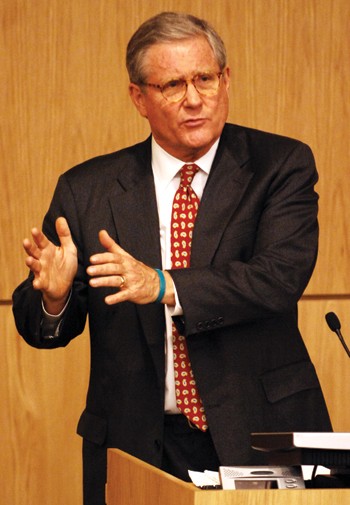
Executive editor of The Weeky Standard Fred Barnes speaks about the 2008 presidential race in the Crum Auditorium on Wednesday night. (Stuart Palley)
The Tower Center Political Forum hosted an event entitled “The Political Landscape for 2008” yesterday in Crum auditorium. It featured journalist Fred Barnes, co-host of Fox News’ “The Beltway Boys” and regular guest on Fox’s Special Report with Brit Hume. Barnes is also the executive editor of The Weekly Standard.
For 10 years, from 1989 to 1999, he was a regular panelist on “The McLaughlin Group.” Barnes was also the senior editor for The New Republic from 1985 to 1995.
Barnes began his speech with a look at Washington D.C. and how the current government is operating.”One way to judge Washington is how it deals with the big issues,” Barnes said.
Citing issues such as the War in Iraq, Congress, entitlement, immigration and healthcare, Barnes says that little has been done between the Republican president and the Democratic Congress in Washington since the 2006 election.
“While the president doesn’t have a lot of influence, he has a lot of power,” Barnes said. “The most important thing the president has been able to do is change the policy in Iraq. Iraq is in a completely different situation that it was 10 months ago. Al Qaeda is practically beaten. The civil war is over.”
Barnes credits the end of the civil war to a grassroots effort through the Iraqi people who want the violence to end.
“I wouldn’t say that we’ve won, but we’re winning,” he said.
Although there have been improvements in the war, which is a major issue in the upcoming 2008 elections, Barnes feels that Congress won’t be much different than it is now and that the new president will have to cope with issues such as healthcare and immigration, which will certainly be on the agenda.
“The president will be a decider,” he said. “That is what makes the presidential election important.”
Barnes says that there are several differences in the upcoming election that are unique. He notes that it will be a war-time election and says that these are usually more volatile.
He also points out that the election is an unusually wide-open race since there is no incumbent or vice president running, a first since 1952. Also, none of the candidates have open ties with the current administration.
“The election will not be a referendum on the Bush administration,” Barnes said.
Another important issue to Barnes is the fact that the presidential primaries are now squeezed together, with the first primary starting in January. In the past, voters have been given a longer period of time, in which Barnes says, they would begin to become interested in the candidates running.
Barnes is uncertain on how the time crunch will affect voters adding that “no one knows what it means.” Coupled with the uncertainty of the primaries on voters, Barnes notes that the candidates are very unusual, which makes it harder to predict the future presidential nominees.
“Right now we’re getting over the perpetual campaign,” he said. “The voters don’t matter.”
Instead, Barnes claims that presidential candidates are directing their attention to other groups, such as lobbyists, noting “money matters more this time” and the fact that voters aren’t watching the candidates as much.
“During the last Republican debate on Fox, 2.4 million people watched,” he said. “Fox was thrilled that 2.4 million people tuned in to watch a debate in October.”
Barnes calls the period after the perpetual campaign “the real campaign” and says the drama in the campaigns will be in the “lightning round.” However, he says that national polls don’t accurately predict the real candidate on top and should not be used to predict the two nominees, recalling several incidences where the “frontrunner” lost.
“We don’t nominate candidates nationally,” he said. “We elect them by states. The national polls don’t mean anything.”
Although Barnes says there is no sure candidate who will win the nomination, he notes that “there is a hangover from 2006,” and that there are hints at which party looks as if it has a chance to take office.
“Two-term presidents are usually not followed by the same party,” he said. “Reagan was followed by Bush and this is the one exception.”
He says this is an encouragement to Democrats, along with the fact that in 2006 they successfully took the majority through going out and registering voters and getting them to turn out for the election.
“It was a moment of sheer horror to Republicans when they realized the Democrats’ effort to register and turn out voters worked,” Barnes said. “The problem is, I don’t think the Republican candidates can duplicate that in 2008.”
Barnes says that although it seems the Democrats have the upper hand, “the future in politics is never a straight line projection.”
“A lot can happen in a year,” he said.








